人教版(新课程标准)选修六 Unit 5 The power of nature 动词ing形式作状语 课件(15张PPT)
文档属性
| 名称 | 人教版(新课程标准)选修六 Unit 5 The power of nature 动词ing形式作状语 课件(15张PPT) |  | |
| 格式 | pptx | ||
| 文件大小 | 777.3KB | ||
| 资源类型 | 教案 | ||
| 版本资源 | 人教版(新课程标准) | ||
| 科目 | 英语 | ||
| 更新时间 | 2022-12-18 20:53:56 | ||
图片预览

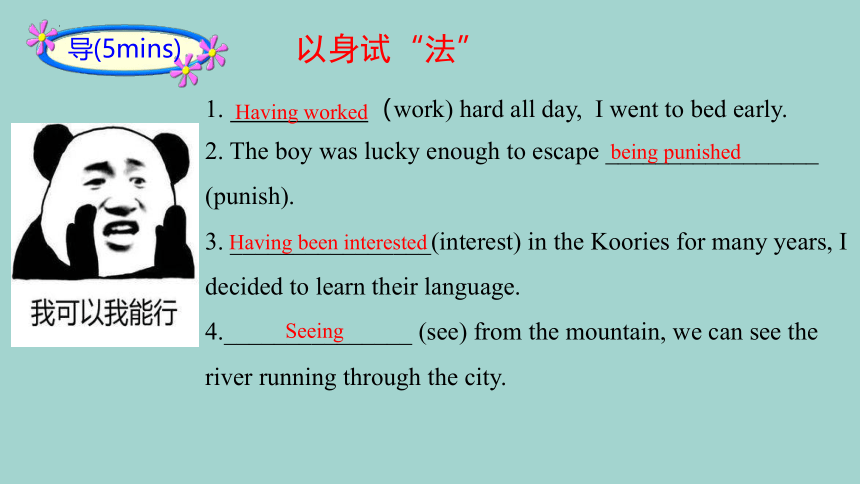
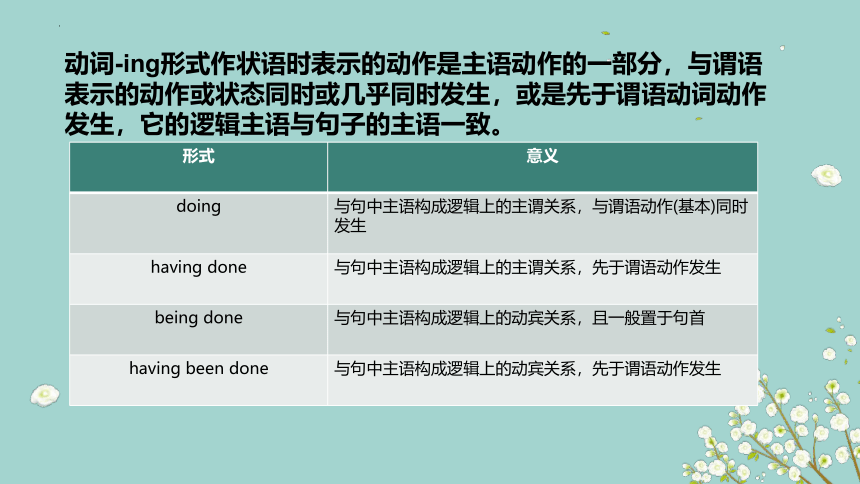
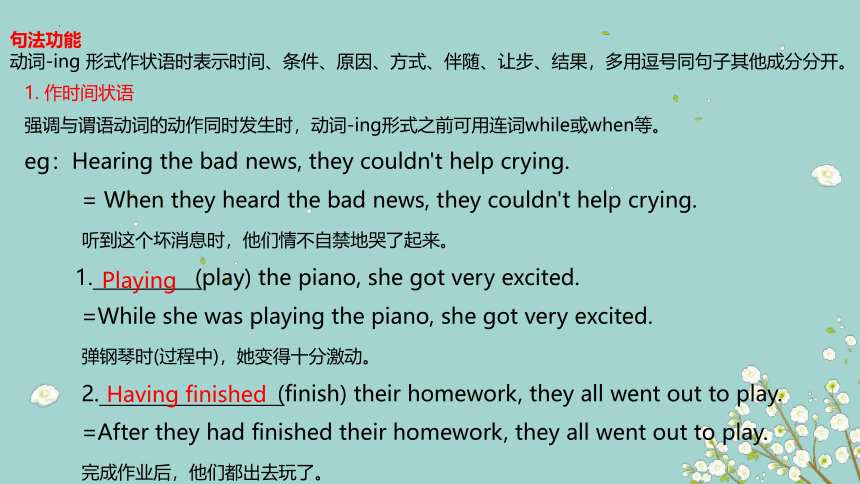
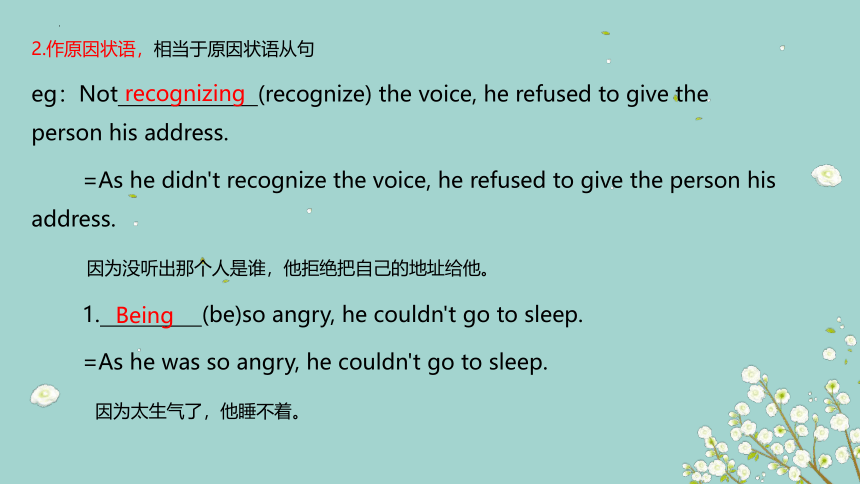
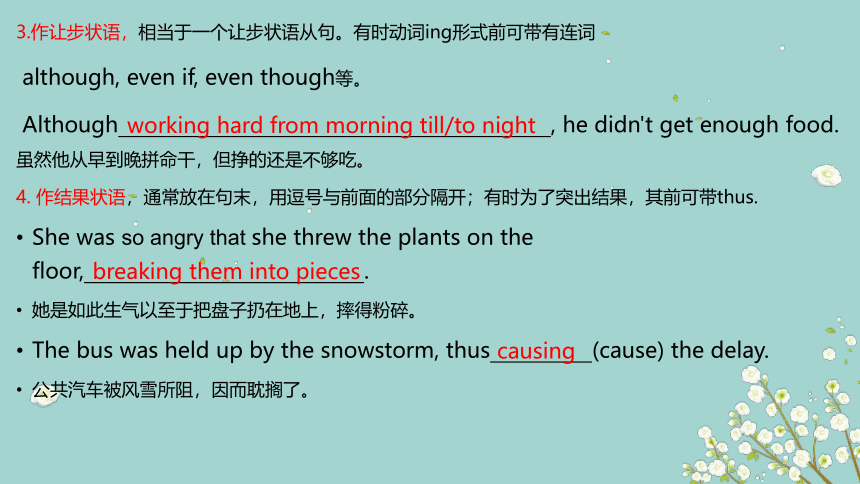
文档简介
(共13张PPT)
Unit5 GRAMMER
动词-ing形式作状语
以身试“法”
导(5mins)
1. (work) hard all day, I went to bed early.
2. The boy was lucky enough to escape _________________ (punish).
3. ________________(interest) in the Koories for many years, I decided to learn their language.
4._______________ (see) from the mountain, we can see the river running through the city.
Having worked
being punished
Having been interested
Seeing
动词-ing形式作状语时表示的动作是主语动作的一部分,与谓语表示的动作或状态同时或几乎同时发生,或是先于谓语动词动作发生,它的逻辑主语与句子的主语一致。
形式 意义
doing 与句中主语构成逻辑上的主谓关系,与谓语动作(基本)同时发生
having done 与句中主语构成逻辑上的主谓关系,先于谓语动作发生
being done 与句中主语构成逻辑上的动宾关系,且一般置于句首
having been done 与句中主语构成逻辑上的动宾关系,先于谓语动作发生
句法功能
动词-ing 形式作状语时表示时间、条件、原因、方式、伴随、让步、结果,多用逗号同句子其他成分分开。
1. 作时间状语
强调与谓语动词的动作同时发生时,动词-ing形式之前可用连词while或when等。
eg:Hearing the bad news, they couldn't help crying.
= When they heard the bad news, they couldn't help crying.
听到这个坏消息时,他们情不自禁地哭了起来。
1. (play) the piano, she got very excited.
=While she was playing the piano, she got very excited.
弹钢琴时(过程中),她变得十分激动。
2. (finish) their homework, they all went out to play.
=After they had finished their homework, they all went out to play.
完成作业后,他们都出去玩了。
Playing
Having finished
2.作原因状语,相当于原因状语从句
eg:Not (recognize) the voice, he refused to give the person his address.
=As he didn't recognize the voice, he refused to give the person his address.
因为没听出那个人是谁,他拒绝把自己的地址给他。
1. (be)so angry, he couldn't go to sleep.
=As he was so angry, he couldn't go to sleep.
因为太生气了,他睡不着。
Being
recognizing
3.作让步状语,相当于一个让步状语从句。有时动词ing形式前可带有连词
although, even if, even though等。
Although , he didn't get enough food. 虽然他从早到晚拼命干,但挣的还是不够吃。
4. 作结果状语,通常放在句末,用逗号与前面的部分隔开;有时为了突出结果,其前可带thus.
She was so angry that she threw the plants on the floor, .
她是如此生气以至于把盘子扔在地上,摔得粉碎。
The bus was held up by the snowstorm, thus (cause) the delay.
公共汽车被风雪所阻,因而耽搁了。
working hard from morning till/to night
causing
breaking them into pieces
5.作条件状语,相当于引导的条件状语从句。
eg:Taking(=If you take) the path that leads out of the town, you will come to a dense wood.
如果你沿着通向郊外的小道前进,就会走到一片密林处。
6. 表示方式或伴随情况
这种用法可以用并列复合句或两个简单句代替。
eg. 1.He stood leaning against the wall.
=He stood and leaned against the wall.
他靠墙站着。
2. .
他们又唱又笑地走进教室。
They came into the classroom singing and laughing
注意问题
1.现在分词有一般式和完成式。现在分词的完成式表示的动作在谓语动词表示的动作之前已经完成。
Having found the answer, he felt relieved.
找到答案后,他如释重负。
2.现在分词被动语态的一般式表示一个被动动作正在进行,或与谓语动词表示的动作同时进行;现在分词
被动语态的完成式表示一个被动动作在谓语动词所表示的动作之前已经完成。
You'll find the topic being discussed everywhere.
你会发现到处都在讨论这个话题。
Having been taught hundreds of words, the students can make up simple dialogues.
被教会几百个单词后,这些学生能组织简单对话了。
3.现在分词的否定结构是在分词前加not,注意不要受谓语动词否定形式的影响。分词完成式的
否定结构通常不把not置于 having和过去分词之间。
Not knowing how to do it, he had to ask for help.
因为不知道该怎样做,他不得不寻求帮助。
Not having received any reply, he decided to write another letter.
4.一般情况下,当动词-ing形式作状语时,其逻辑主语就是句子主语。如果动词-ing短语逻辑主语和句
子主语不一致,即为错句。另外,动词ing形式或动词-ing语也可以有自己的逻辑主语,它们之间有逻
辑上的主谓关系,称之为独立主格结构,逻辑主语通常由一个名词或代词来充当。
Bleeding and fainting, the man lay by the road.
那个人躺在路边,流着血,晕倒了。
School being over, the students left the classroom and went home.
放学了,学生们离开教室回家了。(独立主格)
一、用所给词的正确形式填空
1.__________________(finish) all my letters,I had a drink and went out.
2._________________ _ (injure) in the accident,he had to be taken to the hospital.
3.__________________(not,make) full preparations,we decided to put off the meeting till next week.
4.He sat at the desk,__________________________(read) a newspaper.
5.While ______________________(watch)TV,we heard the doorbell ring.
6.Weather___________________(permit),we’ll go for a picnic the day after tomorrow.
7. _______________(water) the flowers, he began to cut the grass.
8. __________________________ (not do) his homework, he stayed at home.
Having finished
Having been injured
Not having made
reading
watching
permitting
Having watered
Not having done
二、句型转换
1. When she was walking along the street one day, she met an old friend of hers.
______________the street one day, she met an old friend of hers.
2. After she had finished her homework, the little girl began to watch TV.
_______________her homework, the little girl began to watch TV.
3. Because they had been warned by the teacher, they didn’t make such mistakes.
_________________by the teacher, they didn’t make such mistakes.
4. As it was a holiday, all the shops were shut.
_______________, all the shops were shut.
5. When he was still a small boy, he went to France with his father.
_______________, he went to France with his father.
Walking along
Having finished
Having been warned
It being a holiday
Being a small boy
三、用非谓语动词翻译下列句子
1. 由于不知道她的地址,所以我联系不到她。
____________________________________________________
2. 我们来这儿是为了提高我们的英语。
___________________________________________________
3. 他们又唱又跳地进入了教室。
___________________________________________________
4. 听到这个消息,她情不自禁地笑了。
___________________________________________________
5. 关上窗户后,他回家了。
__________________________________________________
Not knowing her address, I can't get in touch with her。
To improve our English,We have come here.
They came into the room, singing and dancing.
Hearing the news, she couldn’t help laughing.
Having closed the windows,he went home.
6. 因为生病了,他没有去学校。
__________________________________________________
7. 如果明天天气晴朗,我们将会去野餐。
__________________________________________________
8.打扫完教室之后,学生们就去操场上看足球赛了。
__________________________________________________
__________________________________________________
9. Mary 站在学校门口,等着Betty。
__________________________________________________
.
Having cleaned the classroom, the students went to the
playground to watch the football match.
Mary stood at the school gate, waiting for Betty.
Being ill,he didn't go to school.
It being sunny, we'll go for a picnic tomorrow.
Unit5 GRAMMER
动词-ing形式作状语
以身试“法”
导(5mins)
1. (work) hard all day, I went to bed early.
2. The boy was lucky enough to escape _________________ (punish).
3. ________________(interest) in the Koories for many years, I decided to learn their language.
4._______________ (see) from the mountain, we can see the river running through the city.
Having worked
being punished
Having been interested
Seeing
动词-ing形式作状语时表示的动作是主语动作的一部分,与谓语表示的动作或状态同时或几乎同时发生,或是先于谓语动词动作发生,它的逻辑主语与句子的主语一致。
形式 意义
doing 与句中主语构成逻辑上的主谓关系,与谓语动作(基本)同时发生
having done 与句中主语构成逻辑上的主谓关系,先于谓语动作发生
being done 与句中主语构成逻辑上的动宾关系,且一般置于句首
having been done 与句中主语构成逻辑上的动宾关系,先于谓语动作发生
句法功能
动词-ing 形式作状语时表示时间、条件、原因、方式、伴随、让步、结果,多用逗号同句子其他成分分开。
1. 作时间状语
强调与谓语动词的动作同时发生时,动词-ing形式之前可用连词while或when等。
eg:Hearing the bad news, they couldn't help crying.
= When they heard the bad news, they couldn't help crying.
听到这个坏消息时,他们情不自禁地哭了起来。
1. (play) the piano, she got very excited.
=While she was playing the piano, she got very excited.
弹钢琴时(过程中),她变得十分激动。
2. (finish) their homework, they all went out to play.
=After they had finished their homework, they all went out to play.
完成作业后,他们都出去玩了。
Playing
Having finished
2.作原因状语,相当于原因状语从句
eg:Not (recognize) the voice, he refused to give the person his address.
=As he didn't recognize the voice, he refused to give the person his address.
因为没听出那个人是谁,他拒绝把自己的地址给他。
1. (be)so angry, he couldn't go to sleep.
=As he was so angry, he couldn't go to sleep.
因为太生气了,他睡不着。
Being
recognizing
3.作让步状语,相当于一个让步状语从句。有时动词ing形式前可带有连词
although, even if, even though等。
Although , he didn't get enough food. 虽然他从早到晚拼命干,但挣的还是不够吃。
4. 作结果状语,通常放在句末,用逗号与前面的部分隔开;有时为了突出结果,其前可带thus.
She was so angry that she threw the plants on the floor, .
她是如此生气以至于把盘子扔在地上,摔得粉碎。
The bus was held up by the snowstorm, thus (cause) the delay.
公共汽车被风雪所阻,因而耽搁了。
working hard from morning till/to night
causing
breaking them into pieces
5.作条件状语,相当于引导的条件状语从句。
eg:Taking(=If you take) the path that leads out of the town, you will come to a dense wood.
如果你沿着通向郊外的小道前进,就会走到一片密林处。
6. 表示方式或伴随情况
这种用法可以用并列复合句或两个简单句代替。
eg. 1.He stood leaning against the wall.
=He stood and leaned against the wall.
他靠墙站着。
2. .
他们又唱又笑地走进教室。
They came into the classroom singing and laughing
注意问题
1.现在分词有一般式和完成式。现在分词的完成式表示的动作在谓语动词表示的动作之前已经完成。
Having found the answer, he felt relieved.
找到答案后,他如释重负。
2.现在分词被动语态的一般式表示一个被动动作正在进行,或与谓语动词表示的动作同时进行;现在分词
被动语态的完成式表示一个被动动作在谓语动词所表示的动作之前已经完成。
You'll find the topic being discussed everywhere.
你会发现到处都在讨论这个话题。
Having been taught hundreds of words, the students can make up simple dialogues.
被教会几百个单词后,这些学生能组织简单对话了。
3.现在分词的否定结构是在分词前加not,注意不要受谓语动词否定形式的影响。分词完成式的
否定结构通常不把not置于 having和过去分词之间。
Not knowing how to do it, he had to ask for help.
因为不知道该怎样做,他不得不寻求帮助。
Not having received any reply, he decided to write another letter.
4.一般情况下,当动词-ing形式作状语时,其逻辑主语就是句子主语。如果动词-ing短语逻辑主语和句
子主语不一致,即为错句。另外,动词ing形式或动词-ing语也可以有自己的逻辑主语,它们之间有逻
辑上的主谓关系,称之为独立主格结构,逻辑主语通常由一个名词或代词来充当。
Bleeding and fainting, the man lay by the road.
那个人躺在路边,流着血,晕倒了。
School being over, the students left the classroom and went home.
放学了,学生们离开教室回家了。(独立主格)
一、用所给词的正确形式填空
1.__________________(finish) all my letters,I had a drink and went out.
2._________________ _ (injure) in the accident,he had to be taken to the hospital.
3.__________________(not,make) full preparations,we decided to put off the meeting till next week.
4.He sat at the desk,__________________________(read) a newspaper.
5.While ______________________(watch)TV,we heard the doorbell ring.
6.Weather___________________(permit),we’ll go for a picnic the day after tomorrow.
7. _______________(water) the flowers, he began to cut the grass.
8. __________________________ (not do) his homework, he stayed at home.
Having finished
Having been injured
Not having made
reading
watching
permitting
Having watered
Not having done
二、句型转换
1. When she was walking along the street one day, she met an old friend of hers.
______________the street one day, she met an old friend of hers.
2. After she had finished her homework, the little girl began to watch TV.
_______________her homework, the little girl began to watch TV.
3. Because they had been warned by the teacher, they didn’t make such mistakes.
_________________by the teacher, they didn’t make such mistakes.
4. As it was a holiday, all the shops were shut.
_______________, all the shops were shut.
5. When he was still a small boy, he went to France with his father.
_______________, he went to France with his father.
Walking along
Having finished
Having been warned
It being a holiday
Being a small boy
三、用非谓语动词翻译下列句子
1. 由于不知道她的地址,所以我联系不到她。
____________________________________________________
2. 我们来这儿是为了提高我们的英语。
___________________________________________________
3. 他们又唱又跳地进入了教室。
___________________________________________________
4. 听到这个消息,她情不自禁地笑了。
___________________________________________________
5. 关上窗户后,他回家了。
__________________________________________________
Not knowing her address, I can't get in touch with her。
To improve our English,We have come here.
They came into the room, singing and dancing.
Hearing the news, she couldn’t help laughing.
Having closed the windows,he went home.
6. 因为生病了,他没有去学校。
__________________________________________________
7. 如果明天天气晴朗,我们将会去野餐。
__________________________________________________
8.打扫完教室之后,学生们就去操场上看足球赛了。
__________________________________________________
__________________________________________________
9. Mary 站在学校门口,等着Betty。
__________________________________________________
.
Having cleaned the classroom, the students went to the
playground to watch the football match.
Mary stood at the school gate, waiting for Betty.
Being ill,he didn't go to school.
It being sunny, we'll go for a picnic tomorrow.
